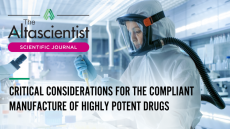Radiant completes first (14) Carbon microdosing study
States has been completed by Radiant Research, who believe this
approach to clinical trials will lead to more accurate and earlier
human pharmacokinetic (PK) data on drug candidates than is
currently possible through conventional development strategies.
"Microdosing or 'Phase 0' studies can be done much earlier than traditional Phase I studies, thereby reducing attrition in clinical development. This will ensure that limited resources are focused on the best drug candidate potentially saving several years and millions of dollars," said Michael Lester, chief executive officer of Radiant Research.
The study re-evaluated the drug azidothymidine (AZT), at sub-therapeutic "nanodose" concentrations (520 nanograms) isotopically labelled with (14)Carbon. This dose is approximately one million fold lower than the recommended daily dose in patients and would be impossible to detect by traditional analytic methods.
In partnership with Vitalea Science, Radiant Research utilised the Accelerator Mass Spectrometry (AMS) technique - currently the most sensitive analytical tool to enter the drug development market place.
With AMS technology, Vitalea scientists were able to quantify AZT concentrations in blood, urine, saliva, white blood cells, and even DNA of white blood cells for more than 72 hours after administering the drug to a human subject.
"The completion of this study is a remarkable milestone for drug development," said Jon Ruckle, medical director of early phase clinical research at Radiant Research.
"The study not only validates our ability to conduct microdosing trials, but also demonstrates the utility of this tool in gathering human PK information about drugs at sub-therapeutic, sub-toxic doses very early in the development cycle," he added.
"We chose AZT for this joint project because it is a prime example of the dual nature of a drug," said Stephen Dueker, President of Vitalea Science.
"AZT carries some risk at therapeutic doses despite its proven ability to reduce HIV viral loads. Indeed, there is no safe and ethical way to evaluate this drug at therapeutic doses in healthy volunteers," he added.
The FDA has sent out a strong call asking for the pharmaceutical industry to modernise the clinical components of drug selection and development. The adoption of microdosing using AMS Technology has been one of many responses to this ongoing problem.
As many as one in three drugs fail in Phase I (healthy volunteer) clinical testing despite extensive pre-clinical screening of potential clinical candidates with a wide variety of in silico, in vitro, ex-vivo and animal models.
A high proportion of these failures can be attributed to sub-optimal pharmacokinetics (PK) leading to potential efficacy or safety issues in humans.
Another company heavily involved with microdosing is Xceleron, who in September 2004, struck a deal with GlaxoSmithKline GSK) which has resulted in the drug giants commissioning the pharmaceutical industry's first in-house Accelerator Mass Spectrometry (AMS) facility.












